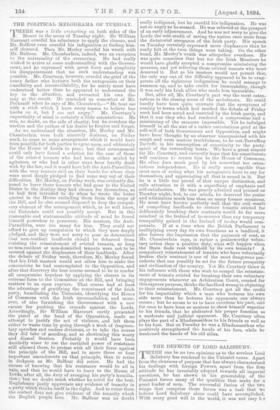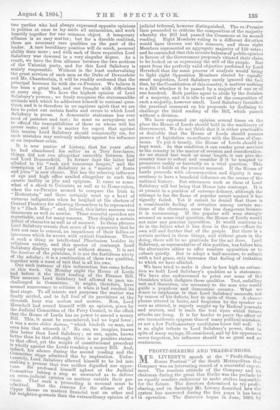THE DEFECTS OF LORD SALISBURY. T HERE can be no two
opinions as to the services Lord Salisbury has rendered to the Unionist cause. Apart from the clearness of purpose that has always characterised his dealings with foreign Powers, apart from the firm attitude he has invariably adopted towards all imperial questions, he has shown in his generalship of the Unionist forces many of the qualities that make for a great leader of men. The successful fusion of the two wings that comprise those forces was a task that we believe Lord Salisbury alone could have accomplished. With every good will in the world, it was not easy Rr two parties who had always expressed opposite opinions in politics at once to lay aside all animosities, and work heartily together for one common object. A temporary alliance is an easy matter; but for a durable coalition, there are necessary rare qualities on the part of the leader. A rare hereditary position will do much, personal ability does more ; and with each of these requisites Lord Salisbury was dowered in a very singular degree. As a result, we have the firm alliance between the two sections of the Unionist party, and for this Lord Salisbury is mainly responsible. Without in the least undervaluing the great services of such men as the Duke of Devonshire and Mr. Chamberlain, it will be readily confessed that the principal honours lie with the ex-Premier. We believe it has been a great task, and one fraught with difficulties at every step. We have the highest opinion of Lord Salisbury's powers ; we freely recognise the statesmanlike attitude with which he addresses himself to national ques- tions, and it is therefore in no captious spirit that we are fain to point out certain faults and errors to which Lord Salisbury is prone. A democratic statesman has ever need of patience and tact ; he must be scrupulous not to offend the susceptibilities of those on whose will his power rests ; and it is matter for regret that against this maxim Lord Salisbury should occasionally sin, for such mistakes may seriously militate against his influence at an important crisis.
It is now matter of history, that for years after he had abandoned his métier as a Tory free-lance, things did not run altogether smoothly between him and Lord Beaconsfield. In former days the latter had alluded to his "rash and rancorous tongue," and the description of Lord Salisbury as a "master of flouts and jeers" is now classic. Nor has the sobering influence of age and high office availed altogether to curb this caustic facility in jibe and epigram. It came as some- what of a shock to Unionists as well as to Home-rulers, when the ex-Premier seemed to compare the Irish to "Hottentots," and there certainly went up a howl of virtuous indignation when he laughed at the electors of Central Finsbury for allowing themselves to be represented by a "Black Man ; " and, indeed, this latter sarcasm was inaccurate as well as unwise. These scornful speeches are regrettable, and for many reasons. They display a, certain defect of character as well as of manner. In these phrases Lord Salisbury reveals that scorn of his opponents that be does not care to conceal, an impatience of their follies or ignorance which he avows with cynical frankness. There is such a thing as intellectual Pharisaism besides its religious variety, and this species of contempt Lord Salisbury displays openly and without shame. It is not the hauteur of the patrician it is not the fastidious nicety of the scholar ; it is a combination of these two qualities, together with a want of tact that is all his own. One such instance of this indiscretion has come before us this week. On Monday night the House of Lords had before it the third reading of the Finance Bill. This measure Lord Salisbury had allowed to pass un- challenged in Committee. It might, therefore, have seemed unnecessary to criticise it when it had reached its final stage. To all intents and purposes the matter was finally settled, and to fall foul of its provisions at the eleventh hour was useless and unwise. Now, Lord Herschell had armed himself with an opinion, given by the Judicial Committee of the Privy Council, to the effect that the House of Lords has no power to amend a money Bill. This, it must be remembered, had no legal force ; it was a mere obiter dictum, "which bindeth no man, not even him that uttereth it." No one, we imagine, knows this better than Lord Salisbury ; no one, again, knows better than he that although there is no positive statute to that effect, yet the weight of constitutional precedent is wholly against the Lords touching a money Bill. And, indeed, his silence during the second reading and the Committee stage admitted this by implication. Unfor- tunately, Lord Salisbury allowed himself to be led into ma -ing a protest that was neither dignified nor oppor- tune. He professed himself aghast at the judicial Committee taking a step so unwonted as to deliver an extra- judicial opinion on matters outside their pro- vince. That such a proceeding is unusual must be admitted. But the reasons for the silence of the "Vpper House on matters financial rest on other and ar weightier.grounds than the extraordinary opinion of a judicial tribunal, however distinguished. The ex-Premier then proceeded to criticise the composition of the majority whereby the Bill had passed the Commons at its second reading. Eight Members voting in a different diraction would have thrown out this measure, and these eight Members represented an aggregate majority of 150 votes ; and he contended that this minute balance of public opinion in favour of the Government proposals vitiated their claim to be looked on as expressing the will of the people. But apart from the perfectly valid objection preferred by Lord Herschell that the same process of analysis would bring to light eight Opposition Members elected by equally small majorities, Lord Salisbury surely ignored the fact that, by the Constitution of this country, it matters nothing to a Bill whether it be passed by a majority of one or of one hundred. Both parties agree to abide by the decision of a majority, and it is idle to cavil at the composition of such a majority, however small. Lord Salisbury furnished the practical comment on his proposals by declining to challenge the third reading of the Bill, which passed without a division.
We have expressed our opinion several times on the place the House of Lords should hold in the machinery of Government. We do not think that it is either practicable or desirable that the House of Lords should possess powers of legislation co-ordinate with the House of Com- mons. To put it tersely, the House of Lords should be kept weak. In this condition it can render great services to the country in the matter of revision and consideration. As we stated last week at some length, it can give the country time to reflect and consider if it be tempted to pronounce rashly or hurriedly on a vital question. This position it holds at the present moment. If the House of Lords proceeds with circumspection and dignity it may continue to have a beneficial influence on the course of the national history. But utterances such as these of Lord Salisbury will but bring that House into contempt. It is at present in a position of extreme delicacy, although the attempt to fan the flame of popular outcry against it has signally failed. Yet it cannot be denied that there is a considerable feeling of irritation among certain sec- tions of the electorate, none the less dangerous because it is unreasoning. If the popular will were strongly aroused on some vital question, the House of Lords would not raise any genuine opposition. It would continue to do in the future what it has done in the past—efface its own will and further that of the people. But there is it certain method in these things, and without grace in the doing, there will be no gratitude for the act done. Lord Salisbury, as representative of this position, has before him the alternative either to offer resolute opposition or to submit quietly. But to adopt a half-measure, to submit with a bad grace, only increases that feeling of irritation to which we have alluded.
We have tried to make it clear in how high an estima- tion we hold Lord Salisbury's qualities as a statesman. We have also endeavoured to point out some of the blemishes which disfigure those qualities. Tact, unfailing tact and discretion, are necessary to the man who would guide a populous and democratic country. What we desire to emphasise is that Lord Salisbury succeeds, not by reason of his defects, but in spite of them. A chance phrase uttered in haste, and forgotten by the speaker as soon as uttered, is eagerly caught up by Radical journals and orators, and is made the text upon which future attacks are hung. It is far harder to parry the effect of one inconsiderate epigram than of many political mistakes, as not a few Parliamentary candidates know full well. It is no slight tribute to Lord Salisbury's power, that in spite of many sayings, ill-considered, and by his opponents never forgotten, his influence should be so great and so continuous.



































 Previous page
Previous page